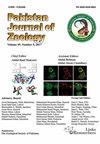Tannic Acid Regulates Autophagy in the Ovary of Female Brandt’s Voles Affecting their Reproduction
IF 0.5
4区 生物学
Q4 ZOOLOGY
引用次数: 0
Abstract
Tannic acid, as a polyphenol, is widely present in dicotyledonous plants and angiosperms. The study found that tannins could affect the ovarian development of Brandt’s voles. However, the specific effects of tannic acid on reproduction and its underlying mechanisms are still poorly understood. Therefore, this study explored the effects of tannic acid on the reproduction of Brandt’s voles. We treated female Brandt’s voles from four weeks postpartum with varying tannic acid doses (0 (control), 0.3% (low dose) or 0.6% (high dose) tannic acids) until 8 weeks (puberty) and 13 weeks (sexual maturity)). Ovarian specimens were collected for immunohistochemical analysis and RT-PCR. The treated Brandt’s voles were mated with male Brandt’s voles of the same age and we recorded the number of embryos, litters and the male to female ratio of the offspring. We found that the female Brandt’s voles in the low-dose tannic acid group had enhanced reproductive abilities, characterized by reduced follicular atresia and increased numbers of embryos and litters of offspring. The different doses of tannic acid altered the female-male ratio of the Brandt’s voles’ offspring. While the low-dose of tannic acid enhanced the level of ovarian autophagy by significantly increasing the expression of Beclin1 and LC3 proteins in the ovaries of the Brandt’s voles during sexual maturity. In short, tannic acid can promote the reproduction of Brandt’s voles by affecting the level of ovarian autophagy and improving the development of follicles. Tannins can boost the reproduction of Brandt’s voles.单宁酸调节雌性布氏田鼠卵巢自噬,影响其繁殖
单宁酸是一种多酚,广泛存在于双子叶植物和被子植物中。研究发现单宁会影响勃兰特田鼠卵巢的发育。然而,单宁酸对生殖的具体影响及其潜在机制仍然知之甚少。因此,本研究探讨了单宁酸对勃兰特田鼠繁殖的影响。我们从产后四周开始给雌性勃兰特田鼠注射不同剂量的单宁酸(0(对照)、0.3%(低剂量)或0.6%(高剂量),直到8周(青春期)和13周(性成熟)。采集卵巢标本进行免疫组织化学和RT-PCR分析。将处理后的布氏田鼠与同龄雄性布氏田鼠交配,记录胚胎数、窝仔数和后代的雌雄比。我们发现,低剂量单宁酸组雌性勃兰特田鼠的生殖能力增强,其特征是卵泡闭锁减少,胚胎数量和后代窝数增加。不同剂量的单宁酸改变了勃兰特田鼠后代的雌雄比例。而低剂量单宁酸通过显著提高性成熟期勃兰特田鼠卵巢Beclin1和LC3蛋白的表达,增强卵巢自噬水平。总之,单宁酸可以通过影响卵巢自噬水平,改善卵泡发育来促进勃兰特田鼠的繁殖。单宁酸可以促进勃兰特田鼠的繁殖。
本文章由计算机程序翻译,如有差异,请以英文原文为准。
求助全文
约1分钟内获得全文
求助全文
来源期刊

Pakistan Journal of Zoology
生物-动物学
CiteScore
1.10
自引率
16.70%
发文量
306
审稿时长
4.5 months
期刊介绍:
Pakistan Journal of Zoology (Pakistan J. Zool.) publishes original articles in English on all aspects of animal life. Generally these articles will be in, or related to one of the following subject areas: Physiology, Cell Biology, Molecular Biology, Genetics, Bioinformatics, Toxicology, Forensic Science, Developmental Biology, Entomology, Parasitology, Microbiology, Biotechnology, Pathology, Palaeontology. Taxonomy, Environmental Biology, Wildlife, Fisheries, Vertebrate and Invertebrate Morphology. Additionally, the journal considers research on health and clinical studies. Short communications are regularly considered, however, uninvited review articles, first records/reports of known species, case reports/studies and survey reports are not published in Pakistan Journal of Zoology.
 求助内容:
求助内容: 应助结果提醒方式:
应助结果提醒方式:


